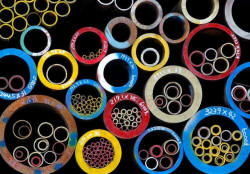Trump defiant after criticism of steel and aluminum
tariffs
 Send a link to a friend
Send a link to a friend
 [March 02, 2018]
By Philip Blenkinsop and Christian Shepherd [March 02, 2018]
By Philip Blenkinsop and Christian Shepherd
BRUSSELS/BEIJING (Reuters) - U.S. President
Donald Trump said on Friday trade wars were good and easy to win,
striking a defiant tone after global criticism of his plan to slap
tariffs on imports of steel and aluminum that triggered a slide in world
stock markets.
The European Union pledged firm counter-measures, China urged Trump to
show restraint and Canada, the biggest supplier of steel and aluminum to
the United States, said it would retaliate if it is hit by U.S. duties.
Trump said on Thursday that tariffs of 25 percent on steel imports and
10 percent on aluminum, designed to safeguard American jobs in the face
of cheaper foreign products, would be formally announced next week.
"When a country (USA) is losing many billions of dollars on trade with
virtually every country it does business with, trade wars are good, and
easy to win," Trump tweeted on Friday.

"Example, when we are down $100 billion with a certain country and they
get cute, don't trade anymore-we win big. It's easy!" the U.S. president
wrote.
The European Commission, the EU executive, called the tariffs a blatant
intervention that amounted to protectionism.
While promising to act "firmly", the European Union, which sees itself
as a global counterweight to a protectionist-leaning Trump, made no
mention of retaliation but spoke of counter-measures that confirm with
World Trade Organization (WTO) rules.
"We see international trade relations as a win-win situation," a
European Commission spokesman said.
"We don't see this as a situation where, like in a zero-sum game, one
party loses because another party wins. Trade is beneficial for
everyone. It needs to take place on the basis of rules and these rules
are in place."
Safeguard measures, last deployed by Europe in 2002 after then U.S.
President George W. Bush imposed steel import duties, would be designed
to guard against steel and aluminum being diverted to Europe from
elsewhere if U.S. tariffs come in.
But to conform with WTO rules such measures would have to apply to
imports from all countries and could also hit producers from China,
India, Russia, South Korea to Turkey.
STOCK MARKETS TUMBLE
Fears of retaliation from Canada, China and Europe sent world stocks
tumbling and drove investors towards the traditional safe plays of
government bonds and the Japanese yen. Europe's STOXX 600 index fell 1.5
percent, following declines on Wall Street and in Asian markets.
[to top of second column] |

Steel pipes for sale are displayed at a shop in the Mullae-dong
steel product district in Seoul July 13, 2010. REUTERS/Jo Yong-Hak/File
Photo

"It is a real worry because Europe is an open global economy so it isn't just
about U.S. versus China," said Ian Ormiston, European equity fund manager at Old
Mutual Global Investors. "And we will see retaliation there are no two ways
about it."
Steel has become a key focus for Trump, who pledged to restore the U.S. industry
and punish what he sees as unfair trade practices, particularly by China.
Although China accounts for only 2 percent of U.S. steel imports, its massive
industry expansion has helped produce a global steel glut that has driven down
prices.
"China urges the United States to show restraint in using protective trade
measures, respect multilateral trade rules, and make a positive contribution to
international trade order," said Chinese Foreign Ministry spokeswoman Hua
Chunying.
Asian steelmakers also worry that U.S. tariffs could result in their domestic
markets being flooded with steel products that have nowhere else to go.
South Korea, the third-largest steel exporter to the United States after Canada
and Brazil, said it would keep talking to U.S. officials until Washington's
plans are finalised.
ArcelorMittal, the world's biggest steelmaker with sizeable European and U.S.
operations, said it was assessing the likely impact, although it said
governments were right to take a tough approach to unfair trade.

(GRAPHIC: Top 10 global steel exporters - http://reut.rs/2F4MJ6T)
(Additional reporting by Jane Chung in SEOUL and Tom Westbrook in SYDNEY, Kaori
Kaneko in TOKYO, Tom Daly in BEIJING, Minami Funakoshi, Chang-Ran Kim and Yuka
Obayashi in TOKYO, Chayut Setboonsarng in BANGKOK and Neha Dasgupta in NEW
DELHI, Ceyda Caglayan in ISTANBUL, Robert-Jan Bartunek in BRUSSELS, Sujata
Rao-Coverley in London and Polina Devitt in MOSCOW; Writing by David Clarke,
Editing by Timothy Heritage)
[© 2018 Thomson Reuters. All rights
reserved.] Copyright 2018 Reuters. All rights reserved. This material may not be published,
broadcast, rewritten or redistributed.
Thompson Reuters is solely responsible for this content. |